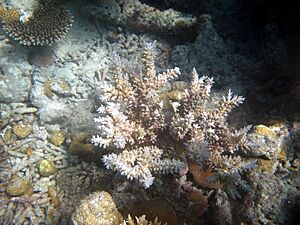Acropora echinata facts for kids
Quick facts for kids Acropora echinata |
|
|---|---|
 |
|
| Conservation status | |
| Scientific classification |
|
| Kingdom: | Animalia |
| Phylum: | Cnidaria |
| Class: | Anthozoa |
| Order: | Scleractinia |
| Family: | Acroporidae |
| Genus: | Acropora |
| Species: |
A. echinata
|
| Binomial name | |
| Acropora echinata (Dana, 1846)
|
|
| Script error: The function "autoWithCaption" does not exist. | |
| Synonyms | |
|
|
Script error: No such module "Check for conflicting parameters".
Acropora echinata is a type of coral that lives in the ocean. It was first described by a scientist named James Dwight Dana in 1846.
You can find this coral in shallow, warm, and clear ocean waters. It usually lives in sheltered coral reefs at depths of about 8 to 25 meters (26 to 82 feet). The Acropora echinata coral is listed as a vulnerable species on the IUCN Red List. This means its population is shrinking. It is not very common, but it can be found over a large area of the ocean.
What it Looks Like
Acropora echinata colonies look a bit like flat, bottlebrush plants. Their branches are thin and arranged neatly. The very tips of these branches are often blue or purple. The rest of the coral is usually white or cream colored, but sometimes the whole coral can be blue.
The small cups where the coral polyps live, called corallites, are tube-shaped and short. They can be hard to see or might not seem to be there at all. This coral lives in clear, shallow, and sheltered reefs. It can also be found on sandy slopes and the floors of lagoons. In aquariums, it can grow to be about 15 centimeters (6 inches) wide.
Where it Lives
Acropora echinata is not a common coral, but it lives in many different places. You can find it in the central Pacific Ocean, Southeast Asia, the Indo-Pacific region, Australia, the Indian Ocean, the East China Sea, and Japan. It has been seen in many parts of Indonesia and the Marshall Islands.
Scientists know that the number of these corals is going down. This coral is very sensitive to changes in water temperature. Warmer water can cause it to "bleach," which means it loses its color and can die. For example, in 1998, all of these corals in Palau were affected by bleaching.
Many things threaten this coral species. These include the overall decline of coral reefs, coral diseases, and fishing. Climate change, the ocean becoming more acidic, and pollution also harm it. A type of starfish called Acanthaster planci also preys on this coral. Acropora echinata usually lives in water temperatures between 27.99 and 28.09 degrees Celsius (82.38 to 82.56 degrees Fahrenheit). Because it is vulnerable, it is also listed under CITES Appendix II, which helps protect it.
How it Was Named
This coral was first named Madrepora echinata by James Dwight Dana in 1846. Later, other scientists sometimes thought it was the same as other corals. For example, Milne Edwards in 1860 thought it was a synonym of Madrepora durvillei. Then, Brook in 1892 thought it was a synonym of Madrepora procumbens. However, it was later recognized as its own distinct species, Acropora echinata.
 | Sharif Bey |
 | Hale Woodruff |
 | Richmond Barthé |
 | Purvis Young |


